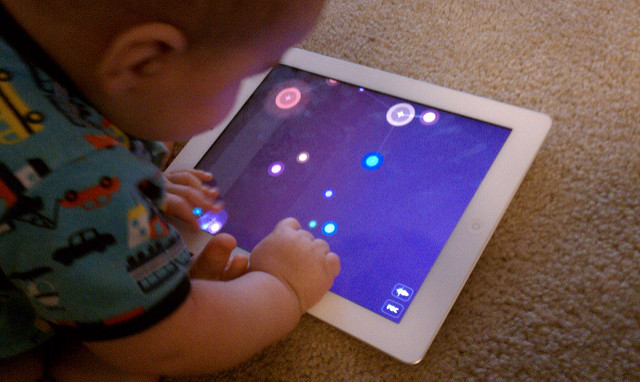
To adjust to our digital world, the American Academy of Pediatrics rebooted its thinking on children’s media use Friday by giving parents considerably looser recommendations than those of the past.
“These are the best recommendations at this point in time based on more recent research,” Anne Francis, AAP spokesperson and general practitioner, told Ars.
Most notably, the academy ditched its strict ban on screen time for kids under the age of two, which had been in place since 1999. Now, the AAP acknowledges that not all screen time is equal, and even very young kids can benefit from certain types of media if parents and caregivers are involved.
Specifically, the AAP now says that for kids of any age—notably infants 0 to 18 months—video-chatting (e.g. Skype and FaceTime) is A-OK with supervision. There's little data to suggest that this is beneficial, but observational studies indicate that babies younger than 18 months can indeed emotionally engage with remote relatives over video chat. This can “facilitate social connections,” the AAP notes. But, for the 0 to 18-month crowd, video-chatting is all the screen time they get.
From 18 to 24 months, the AAP now says that infants can use media as long as a parent or caregiver is present to interpret and repeat educational content. “Because of their immature symbolic, memory, and attentional skills, infants and toddlers cannot learn from traditional digital media as they do from interactions with caregivers,” the AAP cautions in its policy statement.
Basically, kids at this age have trouble translating content from a 2D screen to their 3D world. But, studies found that kids as young as 15 months can learn from media if a parent is there with them, translating and re-feeding them the lessons.
When asked why the new recommendation is for kids aged 18 to 24 months and not 15 to 24 months, the AAP told Ars that it was because toddlers vary so much in their developmental courses, but that “most toddlers will be cognitively ready to learn from screens at 18 months with the parent’s help.”
The AAP notes that kids aged 2 to 5 years can start picking up lessons from media. However, some data suggest that over-reliance on media can mess up kids’ sleep and exercise habits, as well as their social, language, and cognitive development—for example, if they veg out in front of the TV for hours. The AAP recommends setting a limit of just one hour of screen time a day and sticking with “high-quality” content, such as Sesame Workshop and PBS. Again, the AAP recommends that parents and caregivers watch along with kids to help them.
“There was a quip that ‘we need laps at that age more than we need apps at that age,’” Dr. Francis said. It’s understandable if parents need to use screens as a makeshift babysitter occasionally, she added. “If you've got to do it, you've got to do it,” she said. But it’s not recommended.
For kids aged 6 and beyond, the AAP recommends having consistent limits on media, and caregivers should check to make sure that screen time doesn’t get in the way of exercise, a good night’s sleep, and other healthy habits. The academy also suggests parents have media-free times and locations, such as dinner time and bedrooms. Last, the AAP suggests that parents should lead by example in their healthy media habits.
reader comments
74